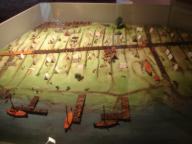 Early Danish Trading Post
|
EC 812 George Mason University Planned for Spring 2009 (revised from 2001 notes) Ent ??? |
|
|
|
||
| Instructor: | Professor Roger D. Congleton | . |
| Office: | 11 Carow Hall (the Center
for Study of Public Choice) Phone 703 993 2328 E-Mail congleto@gmu.edu |
. |
| Office Hours: | 1:15-2:45 Tuesdays-Wednesday, and other times by appointment |
|
|
|
||
| Required Text:. | Nicholson, W. Microeconomic
Theory, Seventh
Edition.
(1998) New York: Harcourt Brace. ISBN 0030244749 (used) |
|
| Optional Texts: | Knight, F. H. Risk Uncertainty and Profit. (1985/1921) Midway Reprint edition, University of Chicago Press. | . |
| . | Mas-Colell, A., Green, J. R., and Whinston,
M. D. (1995)
Microeconomic Theory. Oxford: Oxford University Press ISBN: 0195073401 (used) |
|
| .Course Focus: | Microeconomics II is divided into two parts with related and complementary goals. The first part of the course focuses on the logic of the neoclassical competitive model and explores how that model can be used to explain the origins of such markets, the allocation of goods, the distribution of income. It analyzes circumstances of intense market competition. | . |
|
|
The second part explores implications of what might be called market imperfections: economies of scale, imperfect information, barriers to entry, transactions costs, innovation, regulation and so forth. The coverage is partly is topical and varies by semester. Such topics as the economics of information, normative analysis, culture, political economy, and economic dynamics may be covered. The goal of the course is to provide the student with a thorough understanding of the core neoclassical models, and appreciation of its power by exploring in some depth a few recent extensions of the neoclassical model. |
GMU Data Bases<> JStor , Journals Amazon / BookRadar Econ Department Public Choice , Census |
| . | Tentative Course Outline | . |
| Dates | Topic |
|
| . | I. The Economics of Competitive Markets | . |
| 21-Jan-09 | 1. Introduction to Economic Models |
MWG: 1, 2 Kn 3 |
| . | Methodological Individualism: Rational Choice as a modeling device. Scarcity and optimization. What does rational choice mean? Choosing patterns of consumption. |
First Lecture |
| 27-Jan-09 | 2. Production Alone and on Teams |
MWG: 5 |
| . | Household production, specialization, entrepreneurship, monitoring problems, production by teams | . |
| 03-Feb-09 | 3. Micro Foundations of Supply and Demand |
MWG: 3, 5 Kn: 6 |
| . | What gets produced, how is it produced, and who produces it? Equilibrium Production, Neoclassical firms and Consumers. |
|
| 10-Feb-09 | 4. Micro Foundation of Supply and Demand Continued |
|
| . | More on the Mathematics of Supply and Demand of Inputs, Cost Functions and Consumer Choice. Slutsky and Euler equations. |
|
| 17-Feb-09 | 5. Price Determination in the Long Run |
|
| . | Marshalian and Ricardian Approaches, Insurance Markets, Risk and Uncertainty, Monopolistic, Duopolistic Monopolistically Competitive, and Perfectly Competitive Markets. | . |
| 24-Feb-09 |
6. Review for Midterm Exam |
Selected Ans |
| 03-Mar-09 | MIDTERM EXAMINATION | |
| 10-Mar-09 | SPRING BREAK | |
| 17-Mar-09 | Exams Returned and Reviewed |
|
| II. Market Imperfections and Problems |
||
| 24-Mar-09 | 7.
Introduction to
Welfare Economics Economic Efficiency, the Pareto Criteria, social welfare functions. The welfare properties of exchange (w and w/o externalities). |
MWG: 10, 15, 16 |
|
31-Mar-09
|
8. Market "Failure" and Public Policy Appendix Can public policies make markets work more efficiently? property, theft, fraud, monopoly, and externalities: Regulatory Solutions |
MWG: 11, 12 |
| 07-Apr-09 | 9. Public Policy Analysis (part II) |
MWG: 21, 22 |
| . | Collective Action Problems:
Communal Resources, Club Goods, Public Goods, Cost Benefit Analysis,
Taxation, Regulation, and Politics |
. |
| 14-Apr-09 | 10a. Information Problems, Risk, and Rational Choice |
MWG: 13, 14 |
| . | Risk Aversion and Choice under Uncertainly The effects of consumer ignorance, rules of thumb, rational expectations, and transactions costs. Information Asymmetry: The market for lemons, snob effects. Effects of Uncertainty on Production decisions. Signaling games: advertising and other signals as cheap talk. | . |
| 21-Apr-09 | 10. The Firm: Innovation, Contract, and Control under Imperfect Information |
MWG: 14 Kn: 9, 10 |
| . | Knight, Schumpeter, Kirzner, and Coase. Modern conceptions of the firm. The principal agent problem: between owners and managers, between managers and employees. Incentive compatible contracts. Contracts as screening devices. Separating Equilibria. |
|
| 28-Apr-01 | 6-8 page paper due on an applied micro topic | . |
| 28-Apr-01 | 12.
Culture, the Law, and the Efficiency of Production (Appendix, Some Puzzles for Rational Choice Models) |
Kn: 5, 11 |
|
|
Can culture make markets work better? How much law is necessary? Is there and economic rationale for promoting a work ethic? Status seeking behavior: wasteful or not? Corporate versus national culture and the costs of monitoring. Temptation and self discipline. | . |
| 28-Apr-01 | 13. Overview of the course and Review for the final |
|
| 11-May-01 | FINAL EXAM | . |
| . | Grades: Midterm Exam | 35.00% |
| . | 6-8 page Paper | 25.00% |
| . | Final Exam | 40.00% |
| . | Marginal extra credit for class participation (up to 5% bonus) |
